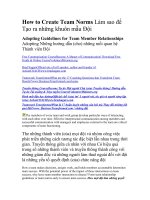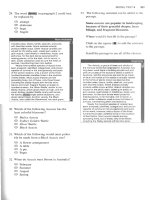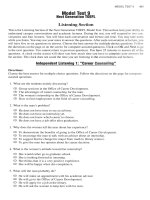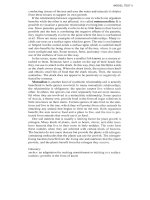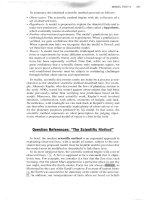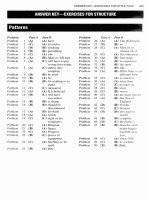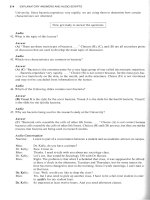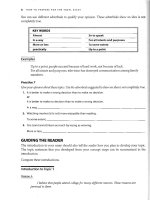How to IELTS Speaking
Bạn đang xem bản rút gọn của tài liệu. Xem và tải ngay bản đầy đủ của tài liệu tại đây (410.5 KB, 7 trang )
How to prepare for IELTS – Speaking
1
Contents
Page
Details of the speaking test 2
Part 1
4
Part 2
6
Part 3
9
General tips for speaking
12
Make sure you have a copy of the How to prepare for IELTS – FAQs booklet in
addition to this booklet.
WWW.RUMENASIA.ORG/VIETNAM
How to prepare for IELTS – Speaking
2
Details of the Speaking Test
Structure of the test
The speaking test is the last test you do on the test day. You will be
given a time slot between about 2pm and 6.30pm.
There are three tasks or parts to the test which takes the form of an
interview lasting between 11 & 14 minutes:
¾ Part 1 Introduction & Interview (4-5 minutes)
¾ Part 2 Individual long turn (3-4 minutes)
¾ Part 3 Two-way discussion (4-5 minutes)
The tasks test your ability to perform the following functions in
English:
• provide personal and non-personal information
• express & justify opinions
• make suggestions
• speculate
• express a preference
• make comparisons & discuss contrasts
• summarise
• relate personal experiences
• analyse
• repair conversation & paraphrase
Procedure of the test
The test is conducted by one examiner. He or she asks all the
questions and assesses you. The test is recorded on audio cassette.
You will be taken to the examiner’s room where you will be asked to sit
either opposite or at right angles to the examiner. The examiner will
then switch on the cassette recorder and start the test.
Marking
Your performance will be assessed on the criteria below:
Fluency & Coherence
Being able to keep going, to talk at a normal rate without unnatural
pauses and hesitations.
Being able to link ideas and language together clearly so the examiner
understands you.
Lexical Resource
How to prepare for IELTS – Speaking
3
Having the vocabulary which enables you to express yourself while
talking about both familiar and unfamiliar topics or being able to get
around any vocabulary gaps without hesitation.
Grammatical Range & Accuracy
Being able to use a variety of grammatical structures appropriately.
Making as few grammatical mistakes as possible.
Being understood despite making grammatical mistakes.
Pronunciation
Being able to use English pronunciation features like stress and
intonation naturally.
Not causing the examiner any problems in understanding what you are
saying.
The examiner will give you a score from 1 to 9 for each of these factors.
They will be converted into one final score between 1 and 9.
WWW.RUMENASIA.ORG/VIETNAM
How to prepare for IELTS – Speaking
4
Part 1 Introduction & Interview (4-5 minutes)
The examiner will introduce himself or herself and confirm your
identity. He or she will then ask you a number of general questions
about yourself to try and make you feel relaxed. You may be asked
about your home or studies. Then you will be asked one or two more
sets of questions on familiar topics such as your interests, your
country, your family or types of things you like in various categories
such as food, clothes, holidays etc. The questions come from an
examiner ‘frame’ (pre-determined questions) so the examiner will not
necessarily follow-up with questions based on what you say. The more
questions that are asked on a specific topic the more difficult they tend
to be. However, you do not have to express a point of view or justify
it in this part.
Some typical questions/prompts might be:
Where do you come from?
What is your home like?
Tell me about your family.
Tell me about your job/studies.
Is there anything you dislike about your job/studies?
What type of transport do you use most?
Do you like reading?
What kind of television programmes do you watch?
Tell me about a film you have seen recently.
Do you have a pet?
What kind of food do you like?
How often do you go shopping?
What’s your favourite festival? Why?
How do people celebrate this festival?
How to do Part 1
• Listen to the questions carefully.
• Give full answers to the questions if possible but don’t anticipate
related questions. For example, if you are asked where you live a
suitable answer would be ‘I live in the new territories – in a village just
outside Sai Kung, called Pak Tam.’
NOT ‘I live in Sai Kung. It’s a really nice town with quite a large
population and lots of seafood restaurants. It’s a lovely place to live as
it’s in the countryside. I have lived there for ten years.’ as this sounds
How to prepare for IELTS – Speaking
5
like a prepared answer and the examiner’s next question might be
‘What’s Sai Kung like?’.
• Don’t give one or two word answers as the examiner can only rate
you on what he or she hears.
• Make sure you relate what you say to what the examiner asks. For
example,
Examiner: Do you like reading?
You: Yes, I do but I don’t get much time to read these days.
How to prepare for Part 1
• Make a list of possible topics you could be interviewed on e.g.
your home
your country
your job
your interests
your school
your family
food
festivals
clothes
books
films
transport etc.
• Write questions for each of your topics and get a family member or
friend to ask you the questions or put them on an audio cassette and
test yourself responding to them.
• Record yourself answering the questions and listen to see how you
can improve your responses.
• Make sure you know all the vocabulary necessary to talk about
these topics. Practice the pronunciation of any new vocabulary.
• Think about the language that will be useful e.g.
ways of expressing likes & dislikes
linkers like ‘even though’ and ‘unless’
tenses to talk about the past and present and your experiences
e.g. ‘I’ve never been to Europe.’ or ‘I went to London for a holiday in
1998.’
WWW.RUMENASIA.ORG/VIETNAM
How to prepare for IELTS – Speaking
6
Practice for Part 1
Books in the SAC
Focus on IELTS: pp.30-31(your city/town), p.56 (music/language to
express likes and dislikes), p.96 (school), p.147 (holidays).
Insight into IELTS: p.100 (linkers), p.101 (possible topics)
Focusing on IELTS: p.56-58 (possible topics & questions), p.70
(answering questions correctly)
IELTS Tutor: p.2-4 (sample topics & sample answers)
Cambridge IELTS 3: p.29, p.53, p.75, p.99
IELTS to Success: p.36 (sample questions)
Part 2 Individual Long Turn (3-4 minutes)
The examiner will ask you to speak for 1-2 minutes on a topic, which
he or she will give you on a card. The card will give you an outline of
what you need to talk about. You will be given one minute to prepare
and you can make notes. The examiner will give you a piece of paper
and a pen. He or she will invite you to start talking when your
preparation time is up. The examiner will not say anything while you
are speaking but will stop you, if you talk for more than two minutes.
Then you might be asked one or two short follow-up questions.
The topics will be of a general nature. You will be asked to describe
things such as a restaurant you enjoy eating in, a book you have read
recently or a piece of equipment in your house you cannot live without.
You will also be asked to relate what you are talking about, to yourself –
e.g. ‘say why you choose to eat in this restaurant’ or ‘say what you
enjoyed about the book’.
For example:
Describe a restaurant you enjoy eating in.
You should say:
where this restaurant is
what kind of menu it has
what other features it has
and explain why you choose to eat there.
How to prepare for IELTS – Speaking
7
This part gives you the opportunity to show that you can speak at
length without hesitation. It is also important to show that you can
organize your ideas coherently.
How to do Part 2
• Read the topic card carefully.
• Use the preparation time wisely. Make sure you have understood
what you need to talk about. Jot down a few points to answer the
prompts on the topic card. Don’t waste time writing sentences.
• Don’t write on the topic card.
• Make sure you answer both parts of the topic card – description
and explanation.
• Organise your talk by following the order on the card.
• Make your talk as interesting and as lively as possible.
• Refer to your notes as you talk, expanding each point you have.
• Make sure you use examples from your own life. It’s much easier
to talk more fluently about your own experiences.
• Try to expand your sentences using linking words like ‘however’ and
‘although’. Don’t use words like ‘moreover’ and ‘thus’ which are
normally used for writing.
• Don’t hesitate for too long. Talk about anything related to the
question rather than nothing at all.
• Try to relax and enjoy talking about yourself!
• Don’t worry about the time. The examiner will stop you when your
time is up.
• Also, don’t worry if the examiner stops you before you have
finished. You will not be penalized for not concluding your talk.
How to prepare for Part 2
• Using the topics you have thought about for Part 1 take them one
at a time and time yourself preparing for one minute and talking
about them for one to two minutes.
• Record yourself talking on these topics. Play the recordings back to
see how easy you are to understand and how you could improve. Use
the checklist on the next page to assess your performance:
WWW.RUMENASIA.ORG/VIETNAM
How to prepare for IELTS – Speaking
9
Part 3 Two-way discussion (4-5 minutes)
The examiner will invite you to participate in a discussion of more
abstract issues linked to the topic of Part 2.
You could for example be asked to talk about people’s eating habits,
diets, fast food or genetically modified food as a thematic link to your
talk on a restaurant in Part 2. The examiner could start the
discussion in several ways e.g. ‘Tell me what you think about …’; ‘What
in your opinion is …’ or ‘How would you compare ..’ etc.
You may be asked to relate the topic to a situation in your own
country – that is Hong Kong.
You will be expected to be able to express your opinions and give
reasons in this part and it is an opportunity to demonstrate your
fluency as well as the range of your vocabulary and grammar.
You will also be expected to use language to clarify your meaning and
repair any breakdowns in communication.
The questions will increase in difficulty slightly as this part of the
test progresses. The examiner may begin by asking you to describe
something and then move on to ask you to compare, evaluate or
speculate.
How to do Part 3
• Remember there is no right or wrong answer. Don’t be afraid to say
what you think about a topic.
• Try to give interesting responses to the examiner’s prompts.
• Show your ability to express abstract ideas and support your
opinions.
• Demonstrate a willingness to give extended responses. Don’t give
one-word answers.
• Try to repair any breakdowns in communication by getting around
a word you can’t think of or don’t know by using other words to
express your meaning.
• Give yourself time to think by using expressions like ‘I’ve not really
thought about this before but …’. See Helpful Hints for IELTS, p.77.
WWW.RUMENASIA.ORG/VIETNAM
